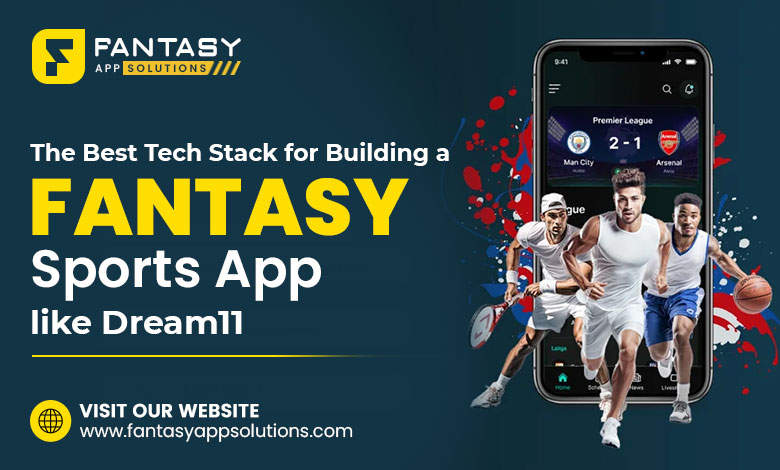Introduction
The surge in popularity of fantasy sports has transformed the way fans engage with their favorite games. Apps like Dream11 have set a benchmark for user engagement, offering dynamic gameplay, seamless interfaces, and robust functionalities. For entrepreneurs and developers interested in creating a similar platform, understanding the best tech stack for fantasy sports app development is crucial. This article will explore the essential components of a tech stack that can drive a successful fantasy sports app, ensuring an immersive user experience while maintaining reliability and scalability.
Understanding Fantasy Sports App Development
Before diving into the technical aspects, it’s essential to understand what fantasy sports app development entails. A fantasy sports app allows users to create virtual teams composed of real-life players and earn points based on the players’ performances in actual games. Features like live scores, user engagement through contests, and social sharing capabilities are integral to such apps.
The choice of technology stack plays a vital role in how these features are implemented. A well-structured tech stack will facilitate smooth operations, efficient data management, and an engaging user interface.
Key Components of the Tech Stack
Front-end Development
The front end is what users interact with; it needs to be visually appealing, intuitive, and responsive.
- Frameworks: React.js and Angular are popular choices for building robust front-end applications. React.js, developed by Facebook, offers a component-based architecture that allows developers to create interactive user interfaces efficiently. Angular, developed by Google, provides a comprehensive framework that includes everything needed for front-end development.
- Mobile Development: For mobile apps, Flutter and React Native are excellent options. Both frameworks enable cross-platform development, allowing you to maintain a single codebase for both iOS and Android, which can significantly reduce development time and costs.
Back-end Development
The back end is the backbone of your fantasy sports app, handling business logic, database management, and user authentication.
- Languages: Node.js is a popular choice due to its non-blocking, event-driven architecture that enhances performance for real-time applications. Python is another strong contender, known for its simplicity and extensive libraries that can expedite development.
- Frameworks: Express.js is a lightweight framework for Node.js that simplifies routing and middleware integration. Django is an excellent choice for Python, providing built-in features for user authentication and admin panel management.
Database Management
A reliable database is essential for storing user data, game statistics, and transactions securely.
- Relational Databases: PostgreSQL and MySQL are widely used relational databases that ensure data integrity and support complex queries. PostgreSQL is particularly favored for its robustness and advanced features.
- NoSQL Databases: MongoDB is an excellent choice for applications requiring flexibility in data storage. Its document-oriented structure allows for dynamic data management, which is beneficial in a fast-evolving environment like fantasy sports.
Real-time Data Handling
In a fantasy sports app, real-time data feeds are crucial for updating scores, player stats, and other game-related information.
- WebSockets: For real-time communication, WebSockets enable two-way communication between the client and server. This is vital for features like live score updates and user notifications.
- APIs: Integrating third-party APIs, such as sports data providers (e.g., Sportradar, Opta), can facilitate access to live game data and player statistics. RESTful APIs or GraphQL can be used to manage these interactions effectively.
Cloud Services and Hosting
To ensure your app is scalable and available, leveraging cloud services is essential.
- Cloud Providers: AWS, Google Cloud, and Microsoft Azure offer scalable cloud solutions that can handle fluctuating traffic and provide robust security measures.
- Containerization: Using Docker can help in creating, deploying, and running applications in containers, ensuring consistency across different environments. Kubernetes can be employed for container orchestration, allowing for automated deployment and scaling.
Payment Gateway Integration
Monetization is a critical aspect of any fantasy sports app. Integrating secure payment gateways is essential for processing transactions efficiently.
- Options: PayPal, Stripe, and Razorpay are popular choices that support multiple payment methods and currencies, ensuring a smooth transaction experience for users.
Security Measures
Given the sensitive nature of user data and financial transactions, implementing robust security measures is crucial.
- Data Encryption: SSL certificates should be employed to encrypt data transmitted between the client and server.
- Authentication: Implementing OAuth for user authentication and incorporating two-factor authentication can enhance security, protecting user accounts from unauthorized access.
Analytics and Monitoring
Understanding user behavior and app performance is vital for continuous improvement.
- Analytics Tools: Google Analytics and Mixpanel can provide insights into user engagement, allowing you to make data-driven decisions.
- Monitoring Tools: Tools like New Relic or Sentry can help monitor app performance and catch errors, ensuring a seamless user experience.
Conclusion
Building a fantasy sports app like Dream11 requires a thoughtfully selected tech stack that addresses front-end development, back-end infrastructure, real-time data handling, and security. Choosing the right technologies will not only streamline the development process but also enhance the user experience, ensuring that your app stands out in a competitive market.
Partnering with a reliable fantasy sports app development company can further streamline this process, providing expertise and insights into best practices. With the right approach and technology, you can create an engaging, scalable, and secure fantasy sports app that captures the hearts of sports enthusiasts. By focusing on a robust tech stack, you’re laying the foundation for a successful venture in the exciting world of fantasy sports.



